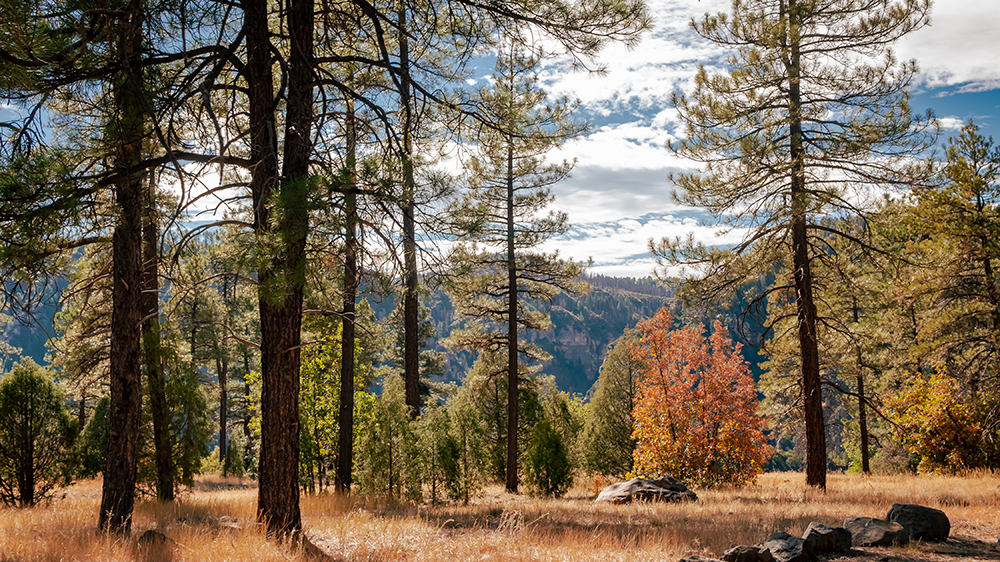Two projects aimed at preparing the next generation workforce for agriculture and forest management, improving agriculture and food security, will start next year as part of a push from the federal government to support Hispanic-Serving Institutions (HSIs).
The projects, led by professors Peter Friederici and George Koch, are sponsored by the U.S. Department of Agriculture’s National Institute of Food and Agriculture, which funded 25 projects aimed at promoting and strengthening the ability of HSIs to deliver programs in food and agricultural sciences, transforming the United States’ food system to be more productive and resilient.
This work is critically important in northern Arizona, which has high rates of food insecurity and food deserts as well as an environment that is profoundly affected by climate change, which puts agriculture at risk.
“As a new HSI in a culturally diverse state and a heavily forested region of the U.S. that is experiencing a multi-decade drought, growing water variability and increasingly severe wildfires, NAU is well-positioned to help prepare the next generation of a workforce that can address these priorities,” said Koch, a professor of biological sciences and faculty in the Center for Ecosystem Science and Society.
Increasing diversity in sustainable food production
Farming is in a complicated place right now; it remains as important as ever, but land is increasingly expensive, the changing climate makes it riskier and there is not enough training for people who want to help the industry evolve. So it doesn’t evolve as quickly as needed, even as everything around it changes, said Friederici, a professor in the School of Communication and NAU’s Sustainable Communities program.
The primary focus of Friederici’s project, “Addressing Barriers to HSI Student Retention through Community-Engaged Sustainable Food Systems Education,” is to prepare young people to enter a variety of food- and agriculture-related jobs and get them ready to take on the needed adaptions to this critical industry. The funding, which includes Rosemary Logan and Alder Keleman Saxena as co-investigators, will pay for 27 NAU students to do internships with sustainable food systems throughout Flagstaff, including working with students from Killip Elementary School and Ponderosa High School, which already have school gardens and other similar programs.
Students of any major can participate and should be able to get internship credit; Friederici hopes that the internships will link to a new undergraduate certificate in sustainable food systems that the grant investigators are developing.
“This project is obviously responding to climate change, which is reshaping how agriculture works in Arizona and raising all sorts of questions about water availability in the future and also what sort of crops can be grown as the climate changes,” he said. “COVID also showed a lot of weaknesses in the current food system and made it clear that many people in northern Arizona suffer from significant rates of food insecurity and are not able to get the healthy food that they might want.”
Living at the intersection of forests, fires and flood
The project of which Koch is PI, “Ecological and Social Science Training and Education at the Intersection of Forests, Fires and Floods in a Changing Climate (ESSTE),” will help prepare NAU students to address climate change in western forest ecosystems, which is critical to USDA’s mission.
This project includes 16 faculty across six academic units, who will design and deliver a two-semester seminar course that starts next fall. The course will give students an overview of ecological and social science perspectives on climate change and have them meet with individuals from agencies, government and the private sector who are working to address the climate challenge in fire-prone and water-stressed western forests. In their third semester, students will do an internship in a niche area of interest to them, with the goal of preparing to work in this field after graduation.
“As fire and climate change continue to impact western landscapes and human communities within them, there is a growing need for professionals who understand the human and ecological dimensions of the problem and can help mitigate the negative impacts,” Koch said. “This program seeks to give NAU undergraduates a head start on careers that will help society meet the challenge of living in and managing our westerns landscapes in a time of rapid change.”




